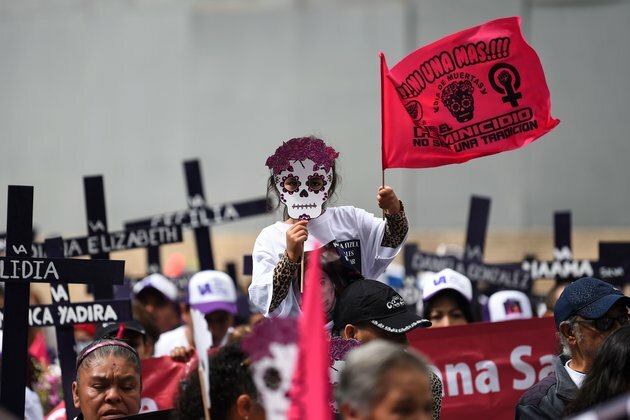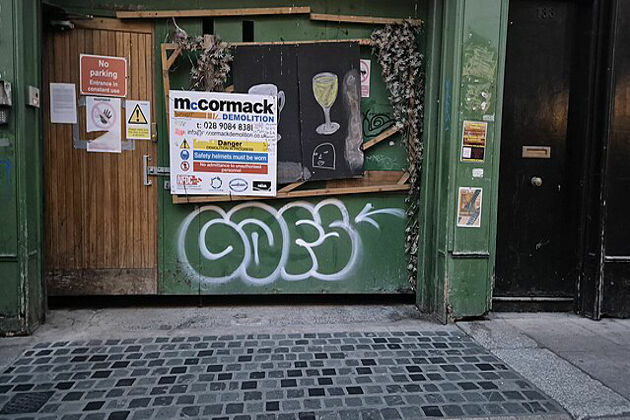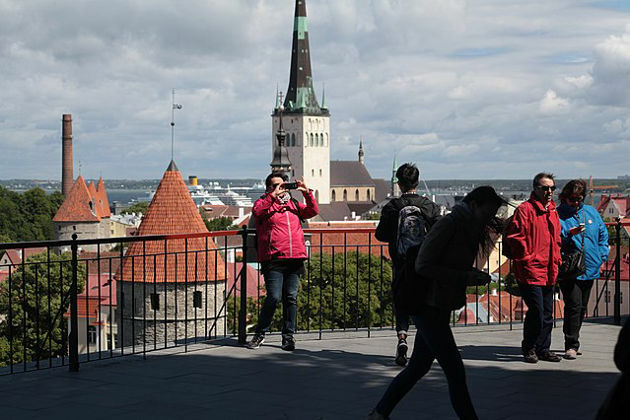Mexico's other epidemic: Murdered women
The Conversation
29 May 2020, 18:10 GMT+10

Domestic violence has spiked in Mexico during its coronavirus-related lockdown. According to a national network of women's shelters, calls for help were up 60% in April.
Even before the pandemic, however, women in Mexico felt under siege. In one of the world's most violent countries, women are raped, murdered and kidnapped with stunning frequency, and the problem is growing.
When I first began teaching gender violence in my Latin American studies classes in 2018, Mexico saw seven femicides - the legal term for the murder of a woman - a day. This year, on average, 10 Mexican women are murdered every day.
Everyday femicides
In February, just before the pandemic hit, two gruesome killings that took place days apart in Mexico City made national headlines.
Midmonth, 25-year-old Ingrid Escamilla was murdered, skinned and partially disemboweled. Her mutilated body became a public spectacle after police who responded at the scene leaked pictures that the media reproduced. Days later, seven-year-old Fatima Aldrighett - kidnapped while waiting for her mother to pick her up from school - was found naked in a plastic bag. Police identified signs of sexual abuse and torture.
While surveillance video resulted in the arrest of two people for Aldrighett's case, Escamilla's killing remains unsolved - a common outcome of murder investigations in Mexico.
After the two gruesome killings in one week, President Andres Manuel Lopez Obrador blamed violence against women on the neoliberal policies of his right-wing predecessors and dismissed Mexico's growing feminist movement as a plot orchestrated by his right-wing opposition.
The Mexican government's dismissive response to femicides sparked intense criticism from feminists, and in March Lopez Obrador's administration unveiled a comprehensive plan to protect Mexican women. It promised to reopen government-funded domestic violence shelters and daycare facilities that were shuttered due to budget cuts last year and launch a smartphone app to report street harassment.
A day without women
Despite the proposal, on March 8, International Women's Day, an estimated 80,000 to 120,000 women (according to official data, although feminist groups argue this number was closer to 120,000) marched in Mexico City and nationwide to demand that the government implement policies to protect women, take femicide investigations seriously and bring justice for victims and their families.
I am a scholar of gender and sexuality in Latin America, and the protest's goals reminded me of the work of anthropologist Rita Segato, who insists that femicides cannot be seen as the act of lone, sick individuals. Rather, Segato says, women's murders result from a larger system of oppression and control over women's bodies.
Mexico's feminist mobilizations continued the next day, March 9, with a women's strike called "A Day Without Us." Despite some criticism of the strike as an elite initiative accessible only to those who can afford to stay home from work, pictures circulated online of half-empty classrooms, subways and streets across the nation.
Within two weeks of the back-to-back feminist protests, Mexico would begin closing down as a result of the coronavirus pandemic. The nation's attention would turn, understandably, away from women's killings and toward public health. More than 8,000 people in Mexico have since died of COVID-19.
But femicides are a major public health problem for Mexico, too - one that will outlast the pandemic. According to the government, 367 women were killed between mid-March and mid-April, the first month of social distancing. Last spring, there were about 300 femicides a month.
Several of Mexico's recent victims were girls, such as 13-year-old Ana Paola, who was raped and murdered inside her northern Mexico home on April 2.
When I teach about Mexico's femicides problem, I talk to my students about misogyny. I use that word not in its common sense, to mean hatred of women, but rather in the way author Kate Manne defines it in her 2017 book "Down Girl: The Logic of Misogyny."
For Manne, misogyny is the "policing of women's subordination" in patriarchal societies - the way people condemn women who don't adhere to social expectations. This instinct has been on display in Mexico, taking the form of a backlash against feminists' efforts to put gender violence higher on the public agenda.
A December 2019 case involving Karen Espindola is a good example of how this social misogyny works. Espindola, a 30-year-old woman from Mexico City, texted her mother late one night about feeling unsafe in a cab. When she didn't arrive home, her brother posted her texts online. Concerned she'd been kidnapped, people across Mexico mobilized to find her.
Espindola, it turns out, was fine. She had simply wanted to stay longer at a party, texted her mother to buy some time, then switched off her phone.
Though Espindola apologized for unintentionally setting off a social media manhunt, she received death threats. The media played surveillance footage from a bar in which Espindola appeared drinking with men, feeding a narrative that her public behavior was inappropriate. Twitter deemed her #KarenMentirosa - #LyingKaren.
Espindola eventually went on national TV to beg forgiveness for partying, for hanging out with men. In short, she apologized for not having been kidnapped.
COVID-19 and violence
President Lopez Obrador likewise continues to downplay the problem of violence against women, claiming without factual basis that "90%" of calls to domestic abuse hotlines are fake." But other members of his administration appear to be taking the issue more seriously.
"We have a patriarchal system," said Mexican Secretary of the Interior Olga Sanchez Cordero on May 20, confirming the administration's commitment to study Mexico's gender violence problem and propose concrete, actionable solutions.
On May 26, Sanchez Cordero's office released its report, which said Mexican authorities had lacked coordination in femicide investigations and promised to restructure how various federal agencies work together to solve these crimes.
Later that same day, the government launched a public awareness campaign about domestic violence. Its concrete, actionable solution for femicides? Advising men who feel angry to breathe deep and "count to 10."
[You're smart and curious about the world. So are The Conversation's authors and editors. You can get our highlights each weekend.]
Author: Alejandra Marquez Guajardo - Assistant Professor of Spanish, Michigan State University 
 Share
Share
 Tweet
Tweet
 Share
Share
 Flip
Flip
 Email
Email
Watch latest videos
Subscribe and Follow
Get a daily dose of Irish Sun news through our daily email, its complimentary and keeps you fully up to date with world and business news as well.
News RELEASES
Publish news of your business, community or sports group, personnel appointments, major event and more by submitting a news release to Irish Sun.
More InformationInternational
SectionFaulty IT system at heart of UK Post Office scandal, says report
LONDON, U.K.: At least 13 people are believed to have taken their own lives as a result of the U.K.'s Post Office scandal, in which...
Travelers can now keep shoes on at TSA checkpoints
WASHINGTON, D.C.: Travelers at U.S. airports will no longer need to remove their shoes during security screenings, Department of Homeland...
Rubio impersonator used AI to reach officials via Signal: cable
WASHINGTON, D.C.: An elaborate impersonation scheme involving artificial intelligence targeted senior U.S. and foreign officials in...
Warsaw responds to migration pressure with new border controls
SLUBICE, Poland: Poland reinstated border controls with Germany and Lithuania on July 7, following Germany's earlier reintroduction...
Deadly July 4 flash floods renew alarm over NWS staffing shortages
WASHINGTON, D.C.: After months of warnings from former federal officials and weather experts, the deadly flash floods that struck the...
Putin fires transport chief, later found dead in suspected suicide
MOSCOW, Russia: Just hours after his sudden dismissal by President Vladimir Putin, Russia's former transport minister, Roman Starovoit,...
Europe
SectionIrish Rail faces 26,000-euro bill after graffiti spree by man
DUBLIN, Ireland: Irish Rail incurred over 26,000 euros in damages due to a series of graffiti incidents carried out by a 24-year-old...
Warsaw responds to migration pressure with new border controls
SLUBICE, Poland: Poland reinstated border controls with Germany and Lithuania on July 7, following Germany's earlier reintroduction...
Ireland’s PM ‘hopeful’ of EU-US tariff deal before July 9 deadline
DUBLIN, Ireland: Taoiseach Micheál Martin has expressed cautious optimism that the European Union and the United States can strike...
Fans perform WWII-era Fascist salute at Marko Perković’s mega concert
ZAGREB, Croatia: A massive concert by popular Croatian singer Marko Perković, known by his stage name Thompson, has drawn widespread...
Ireland’s citizens undeterred as Europe swelters in record heat
DUBLIN, Ireland: Despite extreme heat gripping much of mainland Europe, Irish holidaymakers are pressing ahead with their travel plans,...
Beijing hits back at EU with medical device import curbs
HONG KONG: China has fired back at the European Union in an escalating trade dispute by imposing new restrictions on medical device...












